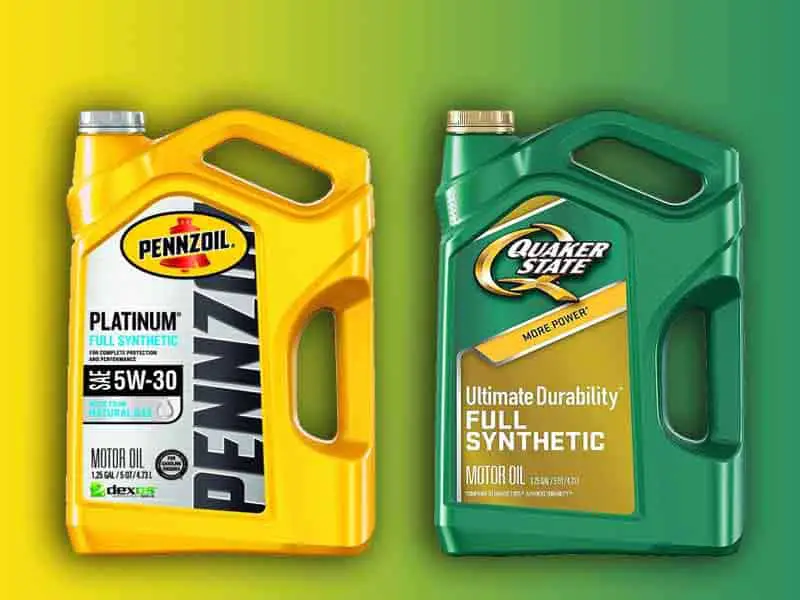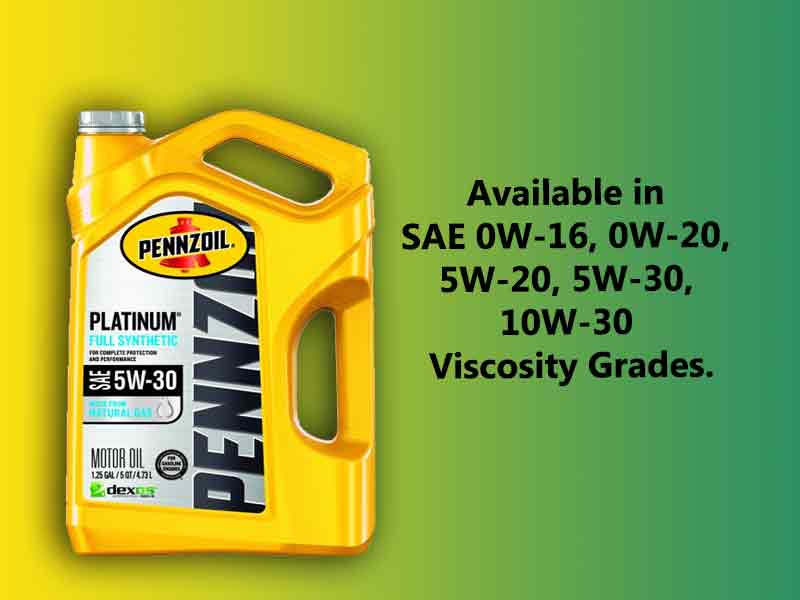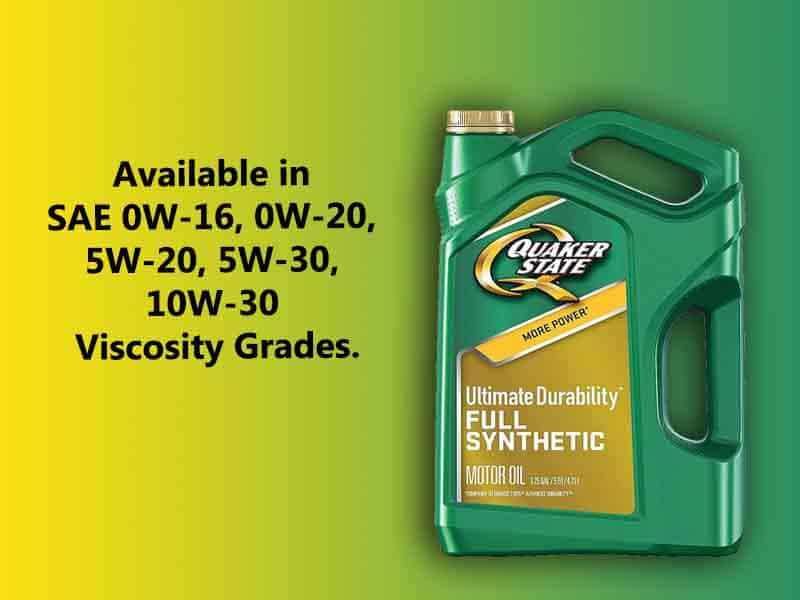Pennzoil and Quaker, both of the engine oils, are technologically advanced. More specifically, Pennzoil is suitable for high-performance engine vehicles, e.g. Sportscars. Besides, Quaker shows compatibility with Hybrid Vehicles.
Pennzoil Platinum Full Synthetic has been manufactured for modern vehicles and their maintenance with advanced parameters in mind.

This is because it keeps the engine running clean because of its superior cleansing technology severe conditions and does not allow its efficiency to decrease.
Besides, Quaker State Ultimate Durability is also like Pennzoil fully synthetic, but its manufacturing has been done keeping in mind the maintenance of sophisticated engines.
As it protects deposits, and therefore it is best for engines like modern turbocharged.
For the top engine performance, Pennzoil provides complete protection. The first motor oil is made by switching natural gas technology.
Experts have said that if you take care of regular oil changes and maintain your car engine performance, then Pennzoil will surely cover up to 300000 miles for ten years exclusively.
Quicker State may be the best overall choice in terms of more fuel economy. This synthetic engine oil has been observed to provide ultimate efficiency along with protection against deposits.
That’s what makes it a better choice to operate your engine at its maximum power.
| Specs | Pennzoil Platinum Full Synthetic | Quaker State Ultimate Durability |
| Oil Type | Full Synthetic | Conventional/Full Synthetic/Synthetic-blend |
| Engine Type | Gasoline and Diesel | Gasoline |
| Available viscosity grades | SAE 0W-16, 0W-20, 5W-20, 5W-30, 10W-30. | SAE 0W-20, 5W-20, 5W-30, 10W-30. |
| ILSAC | GF-6 | GF-5 |
| API | SP, SN, SM | SN Plus |
| Cost | $22.93 for 5 quartz | $19.97 for 5 quartz |
| Oil change frequency | 10000-12000 | 1200-15000 |
| Additives | ZDDP | Zinc |
| ACEA | (A1/B1-10, A1/B1-12) (A5/B5-10, A5/B5-12) | (A3/B3, A3/B4) (C2, C3) |
Table of Contents
Oil Type Comparison
When it comes to the Pennzoil engine oil, it performs even in extreme temperatures since it has lower volatility and is less likely to evaporate. With its designated viscosity grade it makes your engine pistons clean and provides better fuel economy.
Due to the detergents and ingredients of manufacturing, it lubricates your engine, and that’s how the power and efficiency of the engine are promoted.
In comparison, the Quaker oil actions against engine sludge and deposits because of its non-detergent composition. The main feature behind its popularity includes its rust protection from dangerous acids generated by engine contaminants, and that’s how it provides durable wear protection to the engine.
Comparing Additives
Choosing the right additive for manufacturing engine oil is much important because it is highly responsible for the stable running of your engine. Here, Pennzoil has ZDDP or Zinc as an additive.
Zinc as an additive has sticking power to the metal and creates a thinner protective layer which ensures stability in high pressure and load situations.
On the other hand, due to its ultimate durability, Quaker contains a blend of synthetic hydrocarbons and polyalphaolefins. It also uses Zinc or ZDDP additives in its manufacturing. The superior zinc additive provides additional wear security on high-wear surfaces. An active additive diluents called refined mineral oil is also present in it.
Catalytic Converter Performance
There may be several reasons behind the catalytic converter failure, including false timing, spark plugs, and improper fuel mixture.
Pennzoil oils support hyper cleaning technology, which improves catalytic converter performance. Due to the oil compatibility with gasoline engines, it shows stability even in extreme driving conditions.
Besides, Quaker oil is specifically formulated to support the working of your reliable engine and the performances of catalytic converters. Because of its superior zinc additives, the catalytic converter is supported for a significant stretch.
Reduction of Sludge build
Pennzoil Platinum full synthetic is designed to clean accumulated sludge and deposits. The Pennzoil oil includes detergents, dispersants, and friction modifiers used to fights off the sludge. But you need to perform frequent oil changes in order to have sludge free engine.
In the case of Quaker, after just seconds of engine warm-up, Quaker SDA (super detergent additives) starts cleaning engine sludges and deposits. The SDA is specially designed to remove unwanted gum, varnishes, and contaminants that cause droopy engine performances.
Oil Burn-off protection
Oil burns off may lead to decreased engine performance, and it may be caused due to the worn-out of parts.
Pennzoil Platinum full synthetic offers low viscosity protection, which resists oil burns to maintain overall engine performance. Even in extreme temperature conditions, this oil impact positively on efficiency.
Quaker oils offer incredible piston cleaning, which avoids the accumulation of harmful deposits in them. That’s how you avoid oil burn off by cleaning pistons along with the Quaker oil.
Minimizing Engine Wear-Off
Pennzoil oil provides minimum engine wear off, and that’s due to the ZDDP additives. The ZDDP as an additive has sticking power to the metal and creates a protective layer, and this layer highly avoids metal to metal contact.
Quaker oil combat with the friction and wear inside the engine to maintain the overall performance. A proprietary called “zincbooster” has been used in its formulation that has attributes to control oxidation and wear control.
Engine Seals Protection
Pennzoil Full Synthetic oil protects engine seals by avoiding sludges and deposits. Because their accumulation is the main reason behind weaken engine seals. Also, a role in stopping leaks from seals is observed, supporting the well-protected engine.
Quaker oil contains enhanced, active seal conditioning agents that help to stop leaks. Also, quaker was found suitable for older engines to provide durability in additional wear protection and seal conditioning.
Improved Fuel Economy
Pennzoil oils clean and maintains engine performance, which plays an important role in improving fuel economy. If the engine is clean without any harmful sludge, surely the fuel efficiency will be improved.
Besides, Quaker oil is formulated with a fuel-saving additive, which highly reduces friction rate which optimally increases fuel economy. These additives also provide protection against the formation of sludge and harmful deposits, which may cause a decrease in fuel economy.
Viscosity Comparison

The Pennzoil Platinum full synthetic has viscosities of SAE 0W-16, 0W-20, 5W-20, 5W-30, 10W-30. These viscosities may be changed due to the temperature and maybe thicken or thin. It has been said that the thickness of these viscosities prevents friction between moving parts and creates engine efficiency.

On the other hand, quaker offers SAE 0W-20, 5W-20, 5W-30, 10W-30 of viscosities under all driving. These viscosities help to survive and to warm up the engine even in the extreme winter season.
Oil Change Frequency Comparison
Pennzoil Platinum full synthetic offers 10000-12000 miles of oil change frequency. If you do not perform an oil change after it, the engine will start dropping.
While Quaker oils offer you the oil change frequency of 1200-15000, the increased oil change frequency is due to the durability of the quaker.
Quaker wins here!
Cost Comparison
The costs of both engine oils are listed below:
- The Pennzoil Platinum full synthetic costs you $22.93 for five quartzes
- The Quaker state ultimate durability costs you $19.97 for five quartzes
Conclusion
The Pennzoil oil is famous for dual engine type and is frequently used for better performance in various seasons.
The Quaker oil offers a longer oil change frequency than Pennzoil, which makes it specific for vehicles that need to have a longer oil change frequency.
Both motor oil products perform the best to promote the working of heavy engines with their high mileage, additives, substantial grade viscosities and longer life spans.